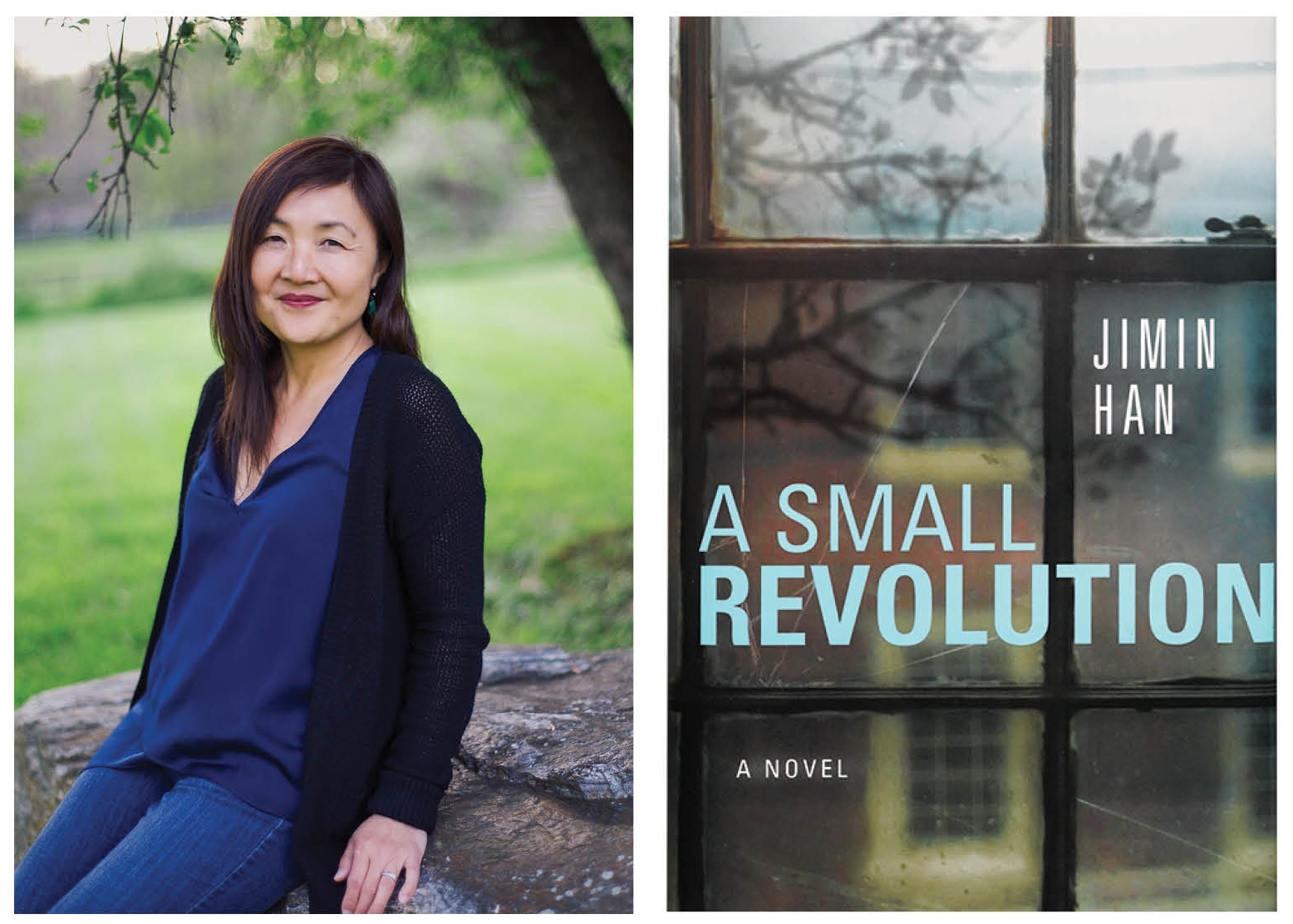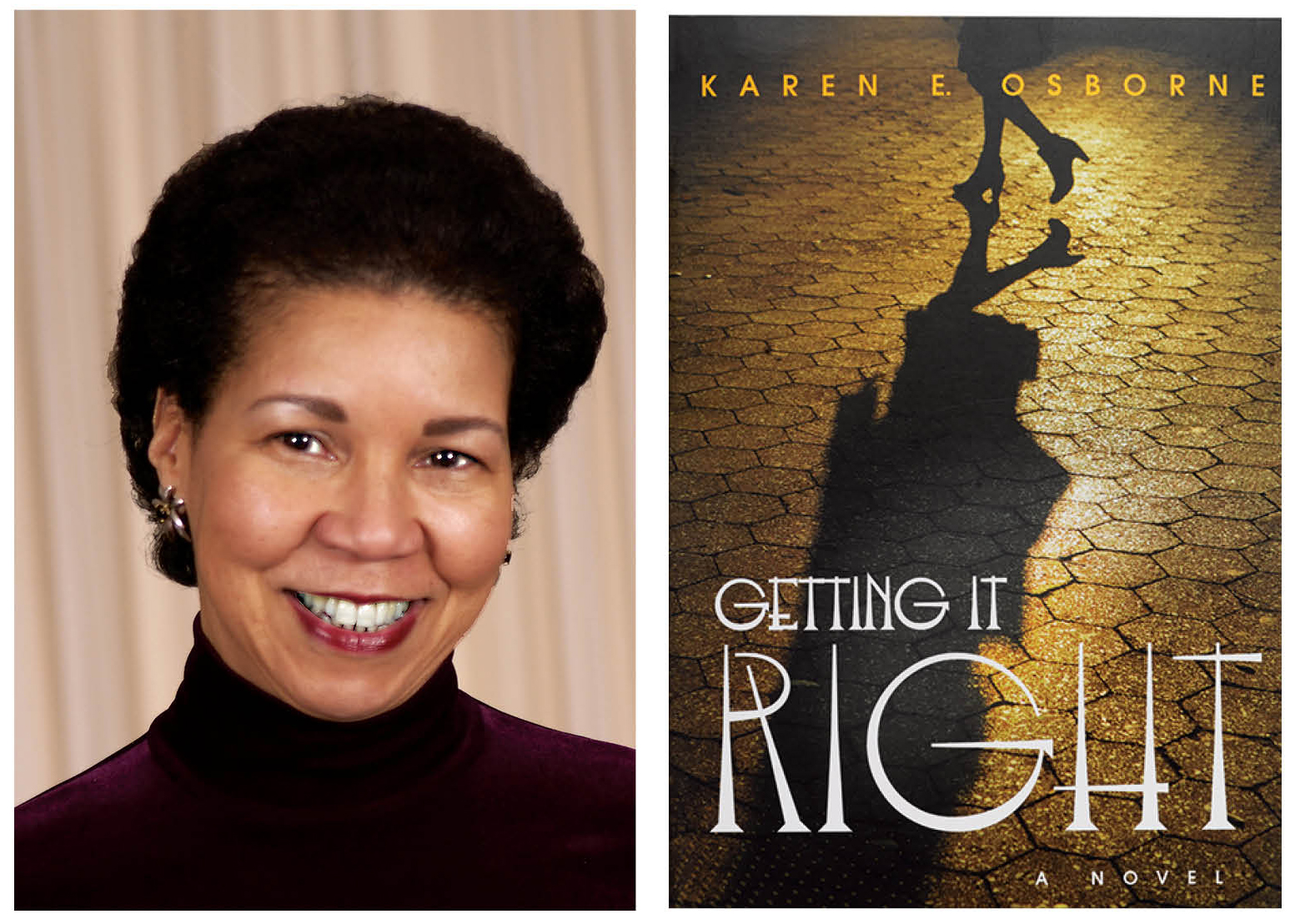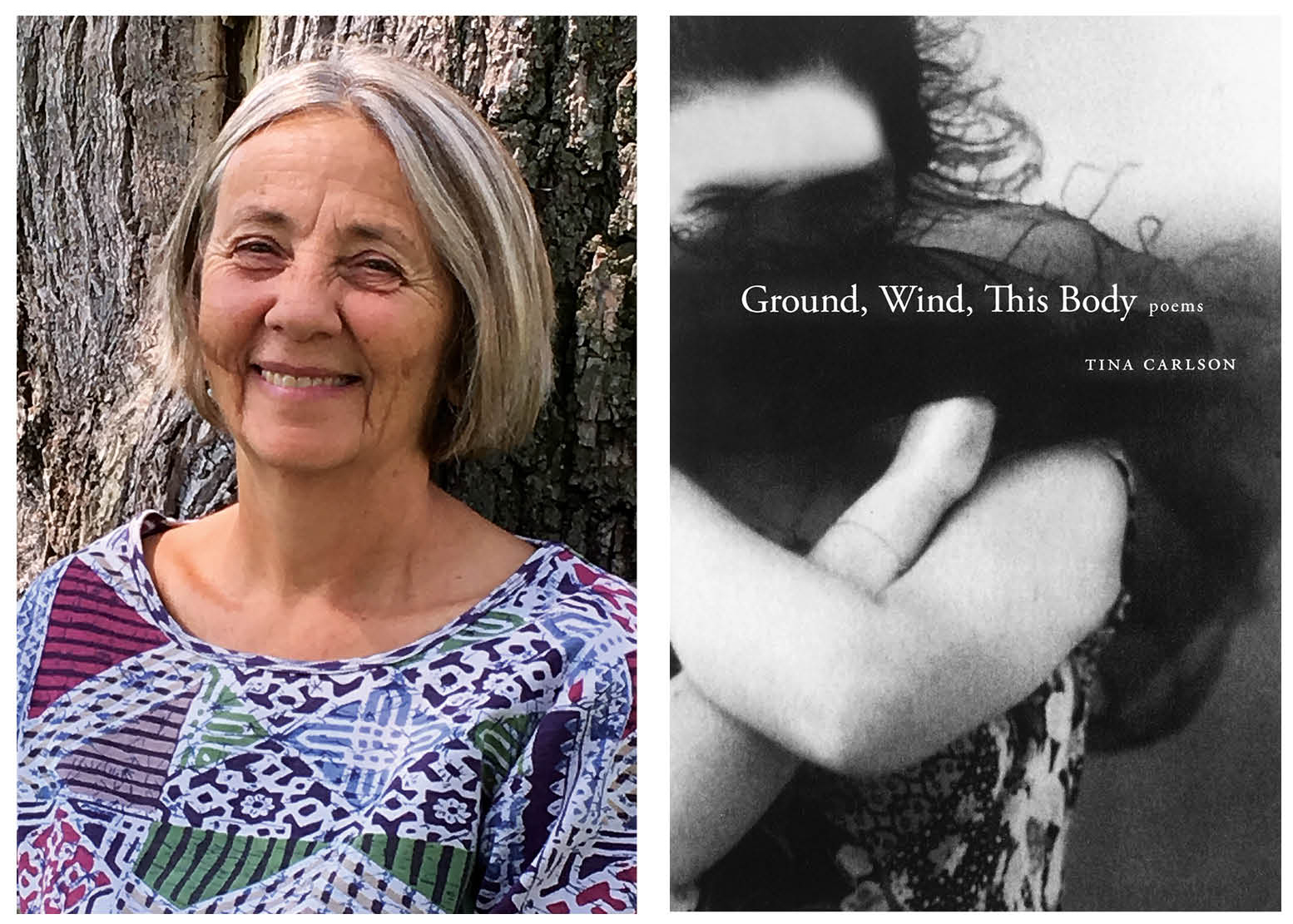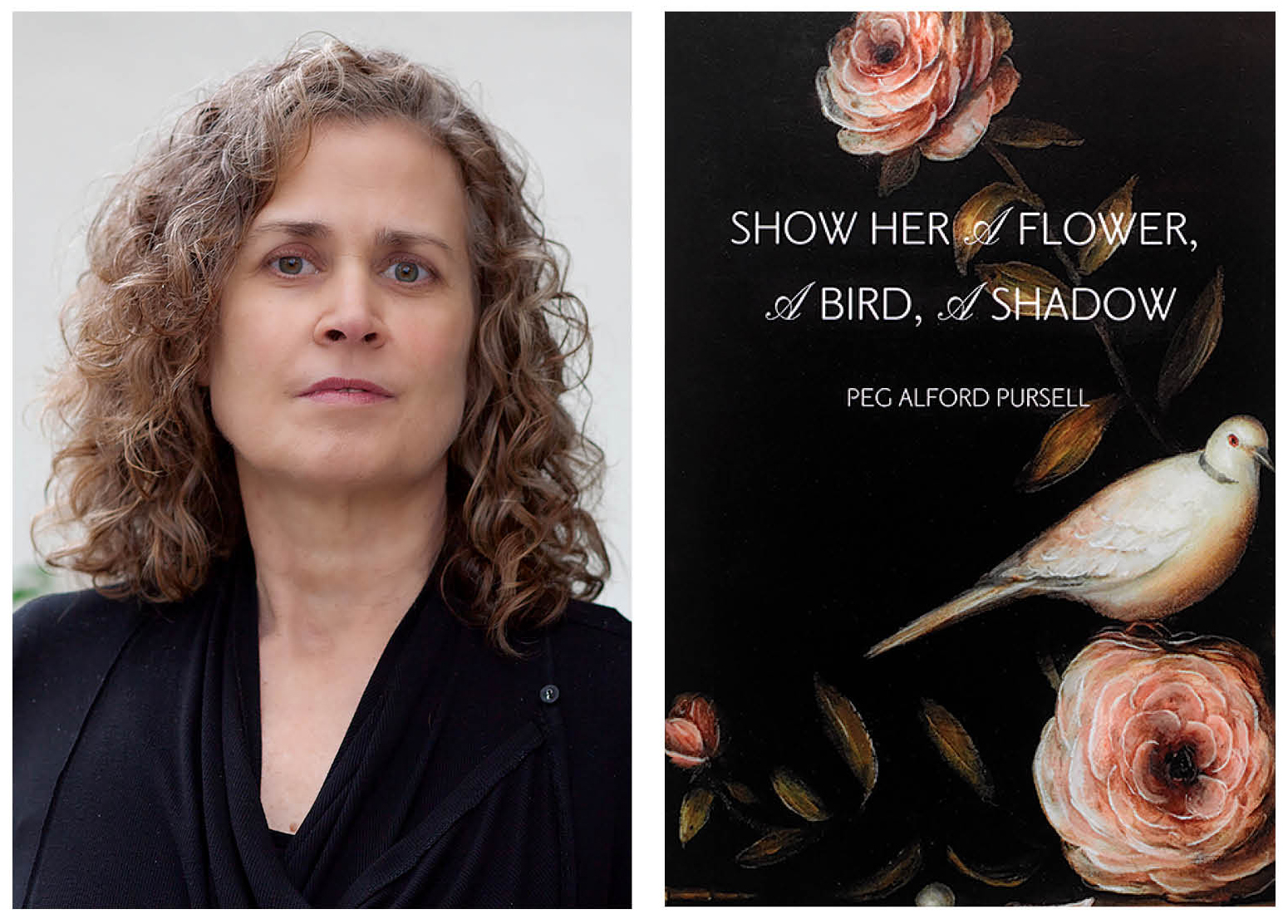From the National Book Foundation’s 5 Under 35 program to the New Yorker’s 20 Under 40 list, many organizations make a point of recognizing young, gifted authors at the start of their literary careers. In the November/December 2017 issue of Poets & Writers Magazine, we feature our second annual 5 Over 50—a selection of five debut authors over the age of fifty whose first books came out this past year. This year’s 5 Over 50 are Jimin Han, Laura Hulthen Thomas, Karen E. Osborne, Tina Carlson, and Peg Alford Pursell. Here, we feature excerpts from their debut books.
A Small Revolution (Little A, May) by Jimin Han
States of Motion (Wayne State University Press, May) by Laura Hulthen Thomas
Getting It Right (Akashic Books, June) by Karen E. Osborne
Ground, Wind, This Body (University of New Mexico Press, March) by Tina Carlson
Show Her a Flower, a Bird, a Shadow (ELJ Editions, March) by Peg Alford Pursell
50over50_jiminhan.jpg

A Small Revolution
By Jimin Han
1
A woman is running in a field of fallen leaves, and a man is running behind her. It’s early enough in the morning for the sky to be gray and the trees to be black, early enough for me to hear only the sound of her breathing and his breathing, except for that moment when he gains on her, makes contact, and tackles her, and she lets out a high-pitched sound cut short as she hits the ground. This is the view I have from my open dorm window into the quadrangle of Weston College in the middle of Pennsylvania.
2
You told me once about a neighbor who had a border collie named Pirate. One day, you were outside early in the morning and saw two wild rabbits in your neighbor’s yard, two small brown ones, and then you heard the back screen door slam and watched Pirate charge across the grass toward those rabbits. One took off for the bushes on the periphery, and Pirate pursued it while the other stayed absolutely still, like a statue, so still you questioned your own eyes. Was it a sculpture of a rabbit in the neighbor’s yard? Pirate trotted out of the bushes, having given up the chase. He had never paid much attention to you before. But you walked toward the dog, calling him by name, rewarding him with long petting strokes, and backed away as slowly as you could, leading him away. When you looked up again, the statue was gone.
3
I remain at the dorm window. I stay, even when I see him stand her up and drag her stumbling by the back of her coat. He turns, retracing his steps, searching the ground, and then picks up something he had dropped earlier. He hoists it up and begins to walk forward again, keeping his other hand on the woman’s coat and yanking her along. I stay, even when I know he is coming for me, even when I can see clearly that it is your friend Lloyd. I stay because the woman is someone I know well, and in his hand is a shotgun.
4
The screams in the hallway launch me toward the phone. I dial 911, and someone on the other end says, “What’s your emergency?”
I think I’m saying, Come now, please, but a voice on the other end says, “Is someone there? I can’t hear you. Can you tell me what’s happening?”
“Yoona!” It’s Daiyu shrieking in the hall. I drop the phone and run to the door and open it.
There are mud splats on her face. Her black hair a squashed nest. Daiyu Chu is a friend of mine from a dorm across campus. There are grass stains on the knees of her pink flannel pajamas. Her blue sweatshirt with the round Weston College logo is smeared with damp patches. Lloyd appears beside her. He’s got a leer on his face, and his hair is wet, as if he has been caught in the rain.
“Yoona, he’s crazy,” Daiyu sobs. I can’t help but step back, and he pushes her into the room. Daiyu scrambles toward the wall by my bed, moving as far from him as she can get, and hides her face in her hands. “What’s—” is the only word I can say as Lloyd turns, still in the doorway, and raises a shotgun into the hall. More screams, and people scatter, and I hear Heather’s voice. “Yoona, you okay?”
Heather Connelly has a room next to mine. Instead of fleeing, she’s coming. “Don’t!” I call out but Lloyd grabs her by the sleeve of her terry-cloth robe, and Heather reaches for Faye Taverson to save herself as if she is falling off a pier, and Faye is caught off guard, and Heather and Faye are reeled into the room.
Lloyd kicks the door closed. And someone pounds on it from the other side. A voice comes through, calling for me. It’s Joanna, the resident adviser.
GO AWAY I’LL KILL THEM ALL, Lloyd explodes. He shoots the gun. His shoulder jerks back. And it’s as if a grenade went off in the room. I crouch on the floor, my arms over my head. There’s ringing in my ears.
There’s no more pounding on the door after that. I’m aware of Daiyu wailing from the corner behind me and Faye huddled on the bed to my left saying, “Oh my god, oh my god,” over and over again and Heather telling everyone to be quiet from somewhere to my right. I’ve heard gunfire before, but something about this room, this space, is louder than anything I’ve heard.
The sirens, when they come, loop as if they’re fading and then growing louder. Are they coming to rescue us, or is it for someone else?
STOP. Lloyd shouts as if his words are coming out of a body that is itself a gun. STOP. STOP. WHATEVER YOU’RE THINKING, STOP. I’LL MAKE ALL OF YOU STOP.
5
“Wait, Lloyd? My friend Lloyd?” you would say. “What’s Lloyd got to do with this? He wouldn’t have a gun. He wouldn’t do this. I know Lloyd, our Lloyd from Korea? Lloyd, my friend Lloyd?” You wouldn’t believe it. You’d refuse.
And I’d tell you I’m sorry. I’m sorry, I’m sorry.
“How’d he get to your college? What’s he doing in your room?” you would say.
I’m trying to tell you.
Listen.
6
My life was simple when I was a child. I walked to school with my older sister. I joined after-school clubs. I went home and did my homework. Some days, after dinner, my father beat my mother. Not often. But there were days when that happened, and in between were the days it was about to.
7
My mother said, “Don’t trust a man, ever.” My sister said, “Don’t trust anyone.” My father said, “No one understands me in this house.”
8
You understood me. You understood Lloyd and me. If you were here in this room, you’d know what to do. What am I forgetting? You said I was good at making lists. To-do lists, to-see lists, to-make-us-remember lists, to-figure-out-how-we-got-here lists. To-tell-you-why-I-could-never-see-you-again lists.
9
The sirens keep coming. Heather holds the palm of her hand to her cheek, and when she takes it away, there’s blood. Behind her in the wall is a four-inch gash as if someone pounded a clawed hammer into it with five circular punctures below it. Buckshot pellets. I know this because my father collects guns.
“Does it hurt?” I say, and she says, “Is it bad?” I remove a pillow from its case and hand it to her. Lloyd is kicking the door in a rhythmic way, shuffling and pacing and kicking, hugging the shotgun to his chest. Is anyone going to come through that door and rescue us?
“Jesus, he’s going to kill us,” Faye says.
He runs at her, the shotgun raised like an axe. WHAT ARE YOU PLANNING BEHIND MY BACK?
I stand up. “Lloyd, what are you doing? The police are here now.”
He whirls at me. OH, SO NOW YOU’LL TALK TO ME. NOW IT’S DIFFERENT, IS IT?
“Lloyd, you don’t have to do this, please don’t do this.”
I’VE GOT PROOF, YOONA. HE’S ALIVE. YOU CAN’T GO THROUGH WITH IT NOW. ADMIT IT.
He means you, and my heart drops every time I’m reminded that you’re dead.
“I don’t understand,” Daiyu whimpers. “What’s happening?”
I can’t explain. I don’t even know myself how Lloyd turned into this. Or is it I who turned into someone who could make him do this?
“What proof do you have?” I say.
I WON’T LET YOU LIE ANYMORE. I LOVED YOU.
Don’t listen to him. It’s not what you imagine love is. I never chose him over you. Don’t think I forgot about you. I didn’t. He doesn’t mean that kind of love, the one you and I had. He means something else. Something he imagined into being.
“Lloyd, you’ve got to accept it’s over,” I repeat. He acts as if he doesn’t hear me and points the shotgun at Daiyu. I hold my breath. And then he lowers the gun and takes a thick roll of gray duct tape out of his coat pocket. He waves it in Heather’s direction. AROUND HER WRISTS AND FEET. DO IT NOW.
When he throws the tape at Daiyu, she misses it. It hits the floor and rolls, and I bend to retrieve it.
He lunges at me, snatches the tape out of my hands, and shoves it into Daiyu’s. DO IT. NOW. He backs away, raising the shotgun at Daiyu’s head. Tears pour down her cheeks as Heather holds out her arms and says, “Do what he wants. It’s okay, it’s just for now, it’ll be okay, Daiyu.” I meet Heather’s eyes, and she looks over at Faye, and I see that Faye has moved toward the door. Lloyd is intent on Daiyu, watching her fumble, her fingers pulling the end of the tape. Faye maneuvers a little closer to the door.
“I’ll listen to you, whatever it is. Let the girls go and we’ll talk. Put the gun away. If you have proof, show me, and we’ll explain to the police,” I tell him.
He looks at me with hate, and I flinch. Without looking at Faye, he steps sideways and nabs Faye’s ponytailed hair. WHERE ARE YOU GOING?
10
I read a statistic that women who were abused as children have a higher likelihood of being in abusive adult relationships. Physical, sexual, all of it. This didn’t make sense to me. I thought it would be the opposite. I thought it was like what Willa’s friend Albert said about his sister, how she’d been raped and so she never sat on a couch with other people after that. She always chose a chair. A single chair, where no one could sit next to her. After the rape, she couldn’t stand to have a man close to her. Which was why, he said, she wasn’t married now and probably wouldn’t ever be in a relationship again. I thought about that. Did this apply to those who witnessed abuse too?
11
Daiyu has finished taping Heather’s and Faye’s wrists. They’re sitting on the edge of my bed. She’s working on Heather’s ankles. Lloyd has barricaded the door with my desk and chair. “You don’t mean to do this, Lloyd. Think about it for a second. This isn’t going to help Jaesung or you. How can you help Jaesung when you’re in jail?”
YOU SHUT UP. He grabs the tape from Daiyu and throws it at me. I catch it, an instinct to keep it from hitting me in the face. It’s a fat new reel, and it stings my hands. I put it on the desk. If I push it aside and then move the chair, I can open the door and escape. Except he will shoot me in the back. Except my friends will be left with him.
I SAID YOUR ANKLES.
I pick up the tape and loosen the end. It smells like plastic and gasoline.
“I’m not going anywhere, Lloyd,” I tell him.
IF I DIDN’T BRING DAIYU HERE, YOU WOULD NEVER HAVE LET ME IN. TAPE YOUR FUCKING FEET OR—
He takes a handgun out of his other pocket. What else does he have in that long wool coat? The handgun is a black square-nosed thing. He pushes the muzzle into Daiyu’s head.
“Yoona,” she whimpers.
I sit beside Faye and Heather. I tape my ankles together, but not completely, only the front where he can see. He sends Daiyu over to wrap my wrists. The sound of sirens is all around us. Still coming and fading, and now not fading anymore. With so many police cars outside, in a few minutes we’ll be free, won’t we? All I have to do is buy us some time. I hold out my wrists to Daiyu, who has not stopped crying. The tears will keep the tape from sticking, I think, and move my hands so her tears land on the sticky part of the tape, but she doesn’t understand and presses the tape down. I shake my head. “I’m so sorry, Yoona,” she sobs.
YOU’RE JOINING THEM. Lloyd pushes Daiyu next to me. In one swish he has bound Daiyu’s hands, and he hauls her to her feet and puts her on the other side of Heather. He hasn’t taped her ankles. My heart lingers on that small fact. The way she curls up, he won’t notice. Will that help us out of this situation somehow?
Then he returns to my side. And my heart sinks. We’re all in a row. Ducks in a row. And he’s too close. I can smell his sweat like rancid milk. He holds the handgun up in front of my face. TAKE A GOOD LOOK AT IT. YOU COULD HAVE BEEN WITH ME, ON THIS SIDE, THE WAY WE PLANNED. YOU’RE MAKING ME DO THIS. ALL YOUR LIES. I GAVE YOU A CHANCE.
The sirens suddenly stop. He runs to the window overlooking the parking lot, slams the window closed, yanks the left and then the right panel of the curtains. They’re the dark-blue blackout sort. Weston splurged this year. Suddenly it’s dark except for a sliver of light that Lloyd allows by pulling back an edge with a finger so he can see the parking lot. It’s quieter now in the room. I can make out the muffled sound of car doors slamming and low voices speaking. Someone whistles as if signaling to someone else. Gravel crunches underfoot. More cars drive up, and engines are cut off.
The phone rings, and Lloyd snatches the receiver and holds it up to his ear but doesn’t let it touch his head, as if he thinks the police can send poisonous gas through it.
THEY’RE FINE. UNLESS YOU DO SOMETHING STUPID. UNDERSTAND?
He thrusts the phone at me. TELL HIM I HAVEN’T HURT ANYONE.
I speak into the mouthpiece. “He hasn’t, but hurry.” Daiyu and Faye join in with their own “Hurry.” Lloyd snatches the phone away, and I can feel his breath on my cheek as he holds the phone between us. SHUT UP OR I’LL TAPE YOUR MOUTHS TOO. They stop.
A man’s voice is on the other end of the phone. He says his name is Detective Sax, he asks if we’re okay, and I look to Lloyd, who nods, so I tell him we’re four of us, four girls. “It’s going to be okay, I promise,” Sax says with such composure I think I might be dreaming this whole thing. “How many gunmen, did you say?” he asks.
“One.”
“Try to stay calm, we’re working on getting you out of there, I promise. If he has a list of demands, tell him to write them down, and I’ll try to get them for him, relax,” he continues.
“His name is Lloyd, Lloyd Kang,” I reply, and Lloyd removes the phone and slams it into its cradle. I DIDN’T TELL YOU TO TELL HIM MY NAME, he howls and holds the butt of the shotgun above my head.
Daiyu and Faye gasp.
“Don’t, Lloyd. If you hurt us, you won’t get anything you want,” I tell him, looking up at him.
He stares at me, and I can see his eyes are rimmed in red as if he’s rubbed them too hard. YOU DON’T EVEN CARE IF HE DIES IN A NORTH KOREAN SHITHOLE.
“But he’s not alive, Lloyd,” I remind him. I can’t make myself call you dead. “The accident in Korea, you remember, he’s gone. There’s no one to save.”
YOU LIE, he spits, lowering the shotgun. Where’s the handgun? Is it close to me on the bed? YOU DON’T EVEN LOVE HIM. I CAN PROVE HE’S ALIVE. WHAT ARE YOU GOING TO DO THEN? HOW ARE YOU GOING TO EXPLAIN TO HIM WHAT YOU WERE GOING TO DO UNTIL I STOPPED YOU?
He waves the shotgun at all of us. YOU’RE GOING TO FREE HIM. HE’S WORTH A HUNDRED OF YOU.
12
Once, in my high school gym, I stepped off the bleachers from the top row, expecting to make my way down as everyone else was doing at the end of a school rally. As soon as my foot found air, I knew something was wrong. Instead of finding a foothold on the level below me, I was falling, and I told myself, I’m falling: I must have time because I’m aware of this, and here is air around me, space and air, I’m falling, I can move my arms, I can put out my hands and brace my fall. So move, now, I told myself, move your arms, get your hands ready. My mind told my hands, my arms, even my legs to adjust, and I was convinced I could still make this happen even as my shoulder slammed onto the polished wooden basketball court, even as my head followed suit, making contact with the surface—I believed I had a chance to affect the way I landed. Stunned, I couldn’t believe how fast the floor had risen to greet me. Hard, unforgivingly hard, and my body ached. I lifted my head. What had happened to my chance? My sister looked down at me from the fifth row, where I’d been moments before, and said, “You fell like a rock.”
13
We sit and wait. Why isn’t Detective Sax calling again? Faye leans into me, and I lean into her. Heather, on the other side of Faye, sits up tall. Daiyu leans into Heather. Lloyd paces, twitching and mumbling at something on his shoulder. From outside, in the direction of the parking lot, come sounds of car doors slamming shut and tires crunching gravel. Loud voices call to each other. I HAVE PROOF. I HAVE PROOF, Lloyd mutters as he paces. He jerks the gun around his body. He and the shotgun are one unit, and we are stuck in our places. I hold my breath. He levels the gun with his other hand, pointing it at each of us one by one. I‘LL KILL THEM. I WILL. YOU KNOW I CAN, he shouts at the ceiling.
It’s Heather who talks to him. “The police aren’t going to let you just kill us. They’ll come in any minute. Give up right now and save yourself.”
Excerpted from A Small Revolution by Jimin Han. Copyright © 2017 by Jimin Han. Published by Little A, 2017. All Rights Reserved.




